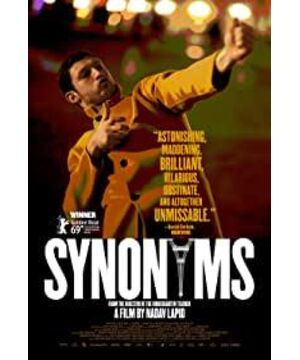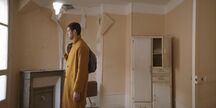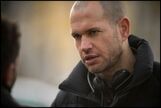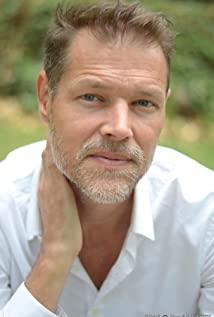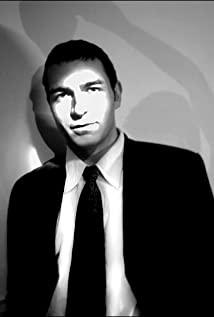Thematically, "Synonyms" is very much like Spike Lee's "Doing the Right Thing", both of which do not over-represent immigration, religion, or racial discrimination, but instead explore the deeper layers of culture and its influence The reason, however, after watching the film, we all have an experience that this problem will never be solved.
In terms of characters and their shaping, the former is far inferior to the latter. It can be said that 80% of the paragraphs before the climax of "Do As You Should" are digging into characters and emotional lines. On the contrary, "Synonyms" tries to use a more postmodern way to separate the characters' emotions, laying out many and broken characters and lines (even except for the male protagonist, no arc can be seen), instead of emotional storytelling. It is only "on the matter of fact", so that at the end, when the protagonist, who has been fully squeezed by the "spirit + body" of the French men and women, went to the orchestra to find a French woman and shouted, the audience could not have any sympathy, but more of a kind of sympathy. Its self-inflicted wait and see. Obviously, the audience has been fully brought into a Western perspective by the director, and every audience here is the French couple.
In addition to the symbols, I personally think that the interesting thing about "Synonyms" is its audio-visual language. It has a little Lou Ye and has a strong self-style at the same time. These audio-visual styles are very attractive to me, and they themselves can become one of the many symbols in the film. a part of.
For example, first of all, it shows the extreme helplessness and loneliness of a foreigner in a foreign country-death and cold, externalized in space, and when a long shot is taken, the vast space covered by the picture is empty, only a cold wall, the protagonist It's useless to tell each other, only the empty street ambient sound, the use of this ambient sound can give the audience a sense of presence in the cold environment of the protagonist more than the use of scary sound effects. The protagonist is robbed of his only source of warmth (a warm home) by the unknown, and quietly waits for death.
Furthermore, the film's photography is very "subjective", that is, the basis for movement is abandoned. On the streets of Paris, the camera imitates the protagonist’s perspective of learning French and looks around, the violent small scene does not shake, and finally returns to the protagonist stably, in order to show the protagonist’s reception of a large amount of information in the new social environment. At the same time, such a violently shaken shot on the street forms a sharp contrast with the stable shot of the characters talking indoors, forming a contrast in the language of different types of spatial shots of "being alone - coexisting".
Then, at 1h5min, the background characters who were originally in the large panoramic position were suddenly dispatched to the foreground to dance, and the whole scene became a close-up within one second so that the camera was blocked, giving people the feeling of a sudden attack of depression. Immediately after using the close-up shot (small scene), the slow shutter followed the beating of the hero, and quickly and violently, without following the rhythm of the hero's beating. Extreme externalization of the orgy state. Examples of this abound in the film, are there other metaphors? I don't quite understand this piece, and I'm worried about over-interpreting it.
In addition, the director's completion of some textual details is also very clever in the expression of personal experience. For example, to express the character's concern for a particular character (shown in the film is the protagonist's ambiguity with the French writer), when he was telling the story, the writer walked out of the door, he stopped in the middle of the story, even if there was another person standing beside him A woman, the writer came back, he continued to speak; the protagonist returned to his cramped room, jumping joyously and indulgently, apparently the director discovered the behavior of his alone time, recorded and reproduced it in the film, which is very similar. In "Call Me By Your Name", Elio's self-behavior in the moments of being alone in his own home is shown, which effectively enhances the prying nature of the point of view in the film.
Another example is that the way to express the emotions between the protagonists is to use two people wearing soundproof headphones to listen to the same piece of music. The girlfriend of one of them came to express the jealousy in the girl's heart by turning off the light and turning on the light (the light changes to a great extent), hoping to notice herself. The director is very careful here, expressing the feelings between the two people ambiguous without making it clear. I don't know whether it is moved by the music or the excitement caused by looking at each other affectionately. This feeling remains in the hearts of the audience, but not clear. Can't explain.
I really like this kind of "full control without rules" film! The readability of the film is quite high, and a group of scholars and teachers should dig deeper into the political, sexual, and religious symbols in the film. Looking forward to learning!
View more about Synonyms reviews


